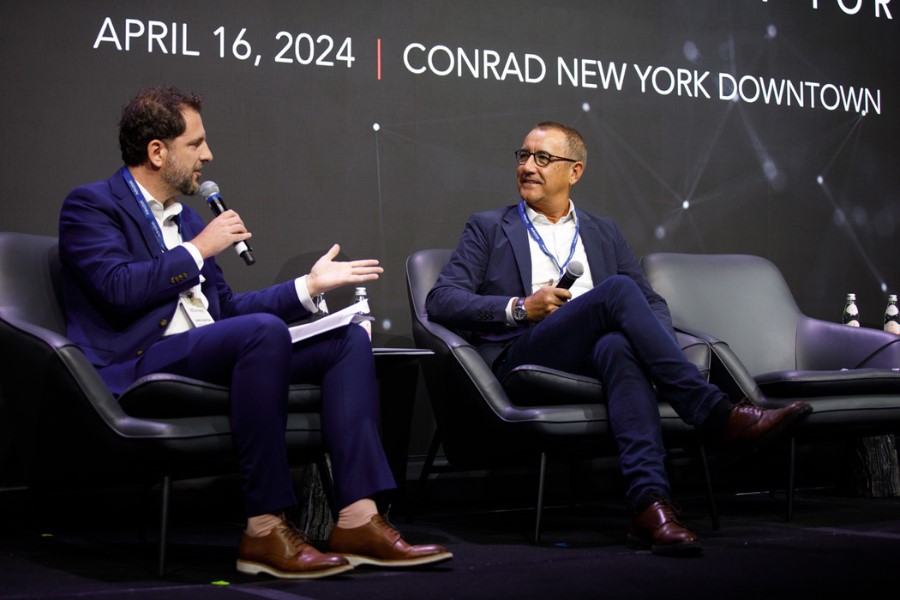

Joe Duran told growth-hungry RIAs to home in on what he believes is the biggest gap in the industry right now – stagnant organic growth.
The renowned business builder, best known for founding United Capital before selling it to Goldman Sachs for $750 million in 2019 (Goldman sold the unit to Creative Planning last year) kicked off InvestmentNews’ inaugural RIA Activate event at the Conrad New York Downtown with powerful messages on sales tactics, effective leadership – “constantly ask yourself if you’re wrong” – and why the RIA space is already deep in phase three: consolidation and differentiation. Essentially, the battle for market share is on.
Last year, Duran launched his latest venture, Rise Growth Partners, where he's executive managing partner. Rise’s aim is to purchase minority stakes in registered investment advisor firms and fuel their growth through additional capital, hands-on operational guidance, and acquisition advice.
Duran told the audience in New York that G1 advisors, who were typically focused on sales through broker-dealers and the insurance industry, have been replaced by G2 advisors, who are more fiduciary- and service-oriented.
“That’s lovely, but it has really impacted organic growth,” Duran said. “There is too much focus on inorganic and acquisitions. The reality is all businesses have to focus on organic growth and it should be a total of 30 percent of your management team’s time.”
Duran says another key factor that will dictate whether a firm is able to grow from $2 billion to $5 billion in AUM to $20 billion to $30 billion is having your own ideas.
“The industry is awash with people saying the same thing, telling us the same story,” he said. “The reality is how you think in original ways, how you stand for your brand, and how you deliver a service that is memorable will help you stick out in a crowd and guarantee the real organic growth. So, there are two main takeaways – brand management and how you actually focus on sales to grow organically.”
The subsequent session, titled “Unlocking the Talent Pipeline: How the NextGen futureproofs your business,” addressed whether younger advisors were equipped bring in those sales. Are NextGen able to marry their digital skills and authenticity with closing deals?
Shannon Spotswood, president of RFG Advisor, believes organic growth will happen but that it will look different than the modus operandi of G1 advisors. The “beautiful thing” about NextGen advisors, she said, is that in addition to being digitally fluid, they are comfortable showing themselves in a public way, something older advisors would find challenging.
“That is such a huge part of what they're selling, but in a very different way [from G1 advisors]. Ultimately, it’s highlighting what clients are looking for in their advisor. There is much more of a life coach element to it," Spotswood said. "It's going to be much more holistic and about the totality of the client's life, and they're going to be able to leverage, in a very natural way, all of these new communication tools which will translate into exponential organic growth far in excess of what we’re seeing in the industry right now.”
Whether it’s recruiting or retaining top talent, the compensation package is naturally an important factor. Ali Criss-Kemp, CEO of Financial Insights Wealth Management, told the audience that companies should double down on benefits that relate to an employee’s family.
“Remember, we're all going to go back to families, family first, and for a lot of people that's their primary motivator,” she said. “So, I talk to them like you know that's what they care about.”
Lauren Oschman, CEO and partner at Vestia Personal Wealth Advisors, added: “If you're going to be generous, make sure that your team members know.
"We were being more generous than I would say the market or other firms, but our employees didn’t know and couldn't fully appreciate what we were investing in them," she said. "So we started creating an annual statement of compensation where we actually detail all of the things we include. For example, we have twice-yearly retreats and the fact you have the potential to travel, and we pay for it, they can see we're investing in them.”
The panelists all agreed that the key to retaining the top NextGen talent is structuring an appealing career pathway. For Kate Kammes, principal and chief talent officer at JMG Financial Group, which celebrated 40 years this year, targeting talent through a university pipeline has reaped rewards, allowing them to grow their book of business over time within the firm. However, she believes there are crucial lessons to be learned when advisors leave, as one did recently.
“It does constitute a question: Are we presenting things early and often in the process, not just with young students, but with those experienced advisors that we're bringing in? We must make sure that the firm is being consistent with what we're sharing and setting a clear path, setting clear expectations, and then having coaching conversations linking it back to those expectations. So, communication, communication, communication.”

Executives from LPL Financial, Cresset Partners hired for key roles.

Geopolitical tension has been managed well by the markets.

December cut is still a possiblity.

Canada, China among nations to react to president-elect's comments.

For several years, Leech allegedly favored some clients in trade allocations, at the cost of others, amounting to $600 million, according to the Department of Justice.
Streamline your outreach with Aidentified's AI-driven solutions
This season’s market volatility: Positioning for rate relief, income growth and the AI rebound
